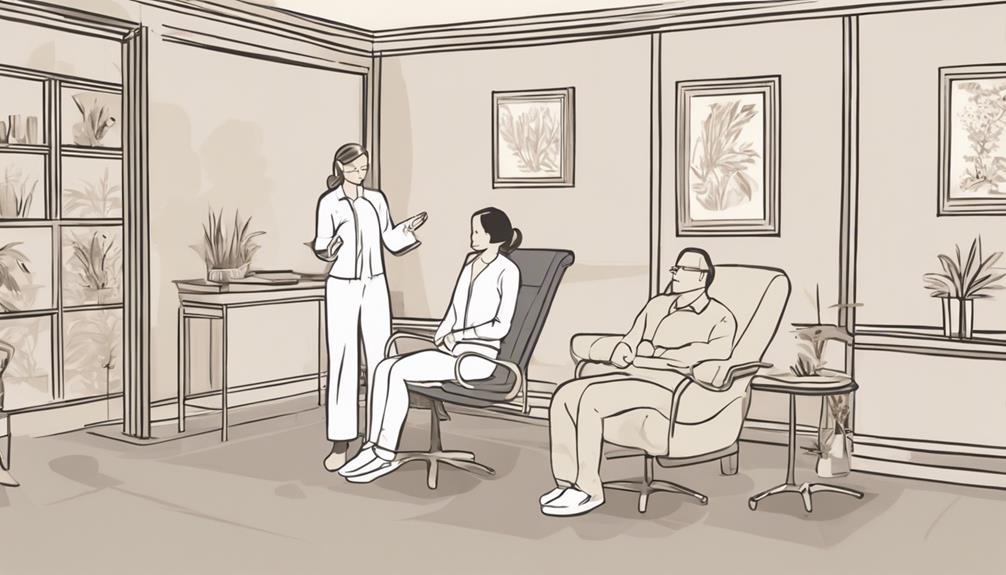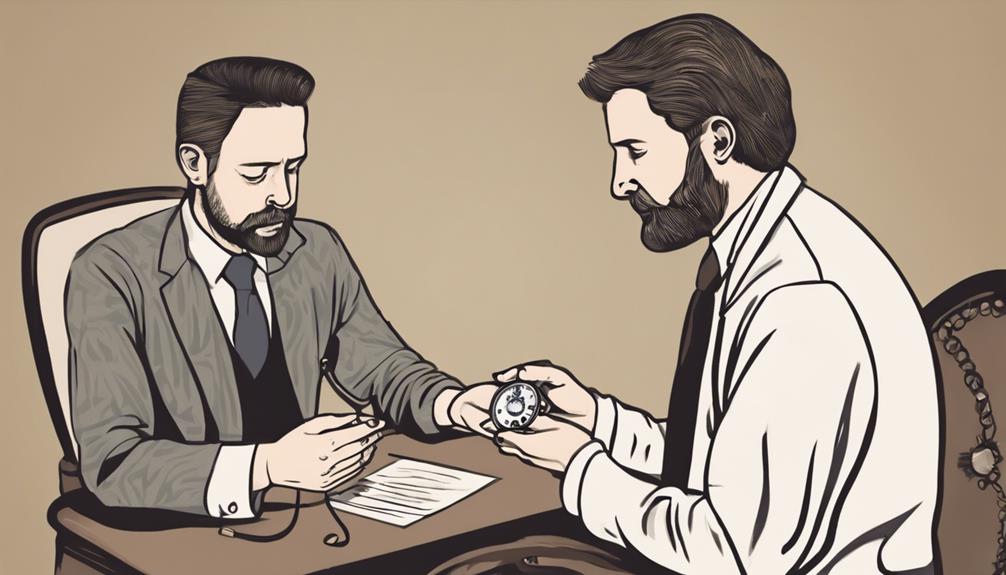For advanced hypnosis inductions in therapy, consider the effective techniques: the Elman Induction Technique, known for its rapid trance induction and enhancing suggestibility. The Hand Levitation Induction promotes relaxation, mind-body connection, and addresses issues like anxiety. Progressive Muscle Relaxation Induction involves systematic muscle relaxation, deep breathing, and guided imagery for receptiveness to suggestions. These methods offer unique ways to induce trance and enhance therapeutic outcomes.
Elman Induction Technique

The Elman Induction Technique is a widely recognized and effective method used in hypnotherapy to induce a state of deep relaxation and suggestibility in clients. This technique, developed by Dave Elman, focuses on rapidly inducing a trance state by utilizing a series of steps that aim to deepen the client's level of hypnosis.
One key element of the Elman Induction Technique is the use of deepening techniques to enhance trance depth. Through progressive relaxation and guided visualization, clients are led to a profound state of relaxation where their subconscious mind becomes more receptive to therapeutic suggestions.
This deepening process allows the hypnotherapist to access the client's subconscious mind more effectively, facilitating the desired therapeutic outcomes.
Hand Levitation Induction
Utilizing subtle movements and focused attention, the Hand Levitation Induction technique is a powerful method employed in hypnotherapy to deepen the hypnotic state and promote therapeutic suggestions.
This technique involves instructing the client to imagine the sensation of their hands becoming lighter and beginning to rise as if guided by invisible balloons, leading to a state of heightened relaxation and receptivity to suggestions.
The benefits of hand levitation in hypnotherapy include facilitating a deeper state of relaxation, enhancing suggestibility, and promoting a stronger mind-body connection.
By engaging the client's imagination and creating a physical response through hand movements, this induction technique can effectively bypass conscious resistance and access the subconscious mind.
In clinical applications, hand levitation induction has been used to address various issues such as anxiety, phobias, and chronic pain management.
Research findings suggest that incorporating hand levitation into hypnotherapy sessions can lead to significant improvements in symptom relief and overall well-being, highlighting its efficacy as a therapeutic intervention in the field of hypnotherapy.
Progressive Muscle Relaxation Induction

Moving from the Hand Levitation Induction technique, another effective method commonly utilized in hypnotherapy to deepen relaxation and enhance suggestibility is Progressive Muscle Relaxation Induction. This technique involves guiding the client through a process of systematically tensing and then relaxing different muscle groups in the body. By focusing on releasing tension in the muscles, individuals can experience a profound sense of physical and mental relaxation, making them more receptive to hypnotic suggestions.
During a Progressive Muscle Relaxation Induction session, clients are typically instructed to start with deep breathing exercises to promote overall relaxation. As the session progresses, the hypnotist guides the individual through each muscle group, encouraging them to tense the muscles for a few seconds before releasing the tension.
Additionally, incorporating guided imagery can further enhance the relaxation experience by encouraging clients to visualize calming and tranquil scenes, promoting a deeper state of relaxation and receptiveness to therapeutic suggestions. Overall, Progressive Muscle Relaxation Induction is a valuable tool in hypnotherapy for inducing relaxation, reducing anxiety, and facilitating positive change.
Frequently Asked Questions
Can Hypnosis Inductions Be Used for Self-Improvement Outside of Therapy?
Hypnosis inductions can indeed be utilized for personal development and mental wellness outside of therapy. They offer a unique avenue for self-improvement, aiding in mindfulness and self-care practices, contributing positively to one's overall well-being.
Are There Any Risks or Side Effects Associated With Hypnosis Inductions?
Potential risks and side effects of hypnosis inductions may include false memories, emotional distress, and exacerbation of certain mental health conditions. Ethical considerations about consent and vulnerability are vital. Research findings on long-term effects are scarce.
How Long Does It Take to Master Advanced Hypnosis Inductions?
Mastering advanced hypnosis inductions requires dedication and practice, typically taking several months to years to develop proficiency. The time commitment varies based on individual learning styles and prior experience. Benefits include personal growth and enhanced therapeutic skills.
Can Hypnosis Inductions Help With Specific Phobias or Fears?
Hypnosis inductions can be effective in fear management by combining relaxation techniques, cognitive restructuring, and visualization exercises. These methods help individuals confront and reframe specific phobias or fears, offering a holistic approach to overcoming them.
Are There Any Age Restrictions for Undergoing Hypnosis Inductions?
Age restrictions for hypnosis inductions vary. Child hypnosis requires special care due to developmental factors. Elderly hypnosis may be suitable but must consider cognitive abilities. Professional hypnotherapists assess individual needs to ensure safe and effective treatment regardless of age.
Conclusion
In conclusion, the Elman Induction Technique, Hand Levitation Induction, and Progressive Muscle Relaxation Induction are three highly effective advanced hypnosis techniques for therapy.
Each induction method offers unique benefits and can be tailored to suit the individual needs of clients.
By incorporating these inductions into therapy sessions, hypnotists can help clients achieve deep relaxation, heightened focus, and improved mental well-being.
These techniques have been proven to be valuable tools in the practice of hypnotherapy.


